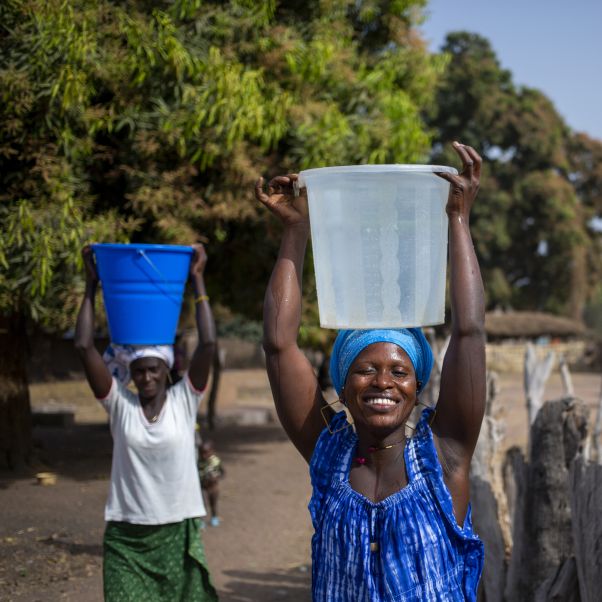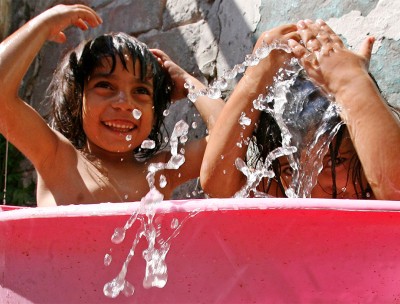OHCHR and the rights to water and sanitation

Globally, 2.1 billion people lack access to safe, readily available water at home, and 4.5 billion people lack safely managed sanitation. Despite progress, significant challenges still remain for the achievement of the Sustainable Development Goal 6 and in addressing huge inequalities between and within countries in accessing basic water and sanitation services.
Achieving the 2030 Agenda and its promise of ‘leaving no one behind’ requires a people-centred focus grounded in international human rights; an integrated approach among the social, economic and environmental dimensions of sustainable development; and partnership among all stakeholders. Addressing the challenges of the SDG 6 requires a paradigm shift – water should be regarded not just as a natural resource to be managed and used, but as a fundamental human right to which all people are entitled without discrimination.
Key aspects of human rights to water and sanitation
Access to safe, affordable and reliable drinking water and sanitation services are basic human rights. They are indispensable to sustaining healthy livelihoods and maintaining people’s dignity. Human rights to water and sanitation are essential for eradicating poverty, building peaceful and prosperous societies, and ensuring that ‘no one is left behind’ on the road towards sustainable development.
International human rights law obliges States to work towards achieving universal access to water and sanitation for all, without any discrimination, while prioritizing those most in need. The key elements of the rights to water and sanitation are:
- availability;
- accessibility;
- affordability;
- quality and safety; and
- acceptability.
Learn more about the human rights to water and sanitation.
Our work on water and sanitation
UN Human Rights works, in line with the 2030 Agenda for Sustainable Development and the Secretary-General’s Call to Action for Human Rights, to promote the practical realization of human rights to water and sanitation and the human rights-based approach to the implementation of SDG 6. We aim to achieve this through:
- Engaging with Governments and local stakeholders through our field presences to support their efforts in addressing challenges related to the human rights to water and sanitation (see an example of our work in Kenya).
- Supporting the mandate of the Special Rapporteur on the human rights to water and sanitation and the work of other UN human rights mechanisms related to the human rights to water and sanitation.
- Strengthening partnerships and integration of human rights to water and sanitation in the United Nations system. We actively contribute to the work of UN-Water and support the integration of human rights under the SDG 6 Global Acceleration Framework and the UN-Water Roadmap for the integration of human rights to water and sanitation.
Latest publications and resources
World Water Development Report 2023: The year 2023 marked the first major conference of the United Nations (UN) dedicated to water since 1977. The focus of the UN 2023 Water Conference (22-24 March) was on progress towards water- and sanitation-related goals, coinciding with the mid-term comprehensive review of the International Decade for Action, ‘Water for Sustainable Development 2018–2028’. The United Nations World Water Development Report 2023 directly informed the UN conference discussions, describing how building partnerships and enhancing cooperation across all dimensions of sustainable development are essential to accelerating progress towards the Sustainable Development Goal for water and sanitation (SDG 6) and realizing the human rights to water and sanitation.
World Water Development Report 2019: The United Nations World Water Development Report launched 19 March 2019 during the 40th session of the United Nations Human Rights Council (UNHRC), and in conjunction to the World Water Day, demonstrates how improvements in water resources management and access to water supply and sanitation services are essential to addressing various social and economic inequities, such that ‘no one is left behind’ when it comes to enjoying the multiple benefits and opportunities that water provides.
Eliminating discrimination and inequalities in access to water and sanitation (2015): This policy brief aims to provide guidance on non-discrimination and equality in the context of access to drinking water and sanitation, with a particular focus on women and girls. PDF: English
View all publications and resources
Videos
Social Forum 2022 Water for Human Rights and Sustainable Development
Watch on UN Web TV: 1st meeting | 2nd meeting | 3rd meeting | 4th meeting
Volkan Bozkir, President of the 75th session of the General Assembly sends a message on World Toilet Day
19 November 2020
Watch on UN Web TV
We need water to survive
6 April 2020
Watch on YouTube
Water is a human right
17 February 2016
Watch on YouTube



